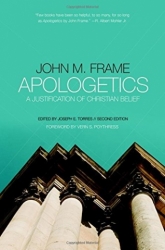A Brief Book Summary from Books At a Glance
About the Author
John Frame is the J. D. Trimble Professor of Systematic Theology and Philosophy at Reformed Theological Seminary in Orlando and the author of many books, including the four-volume Theology of Lordship series.
Introduction
This book is a revision of Frame’s earlier publication Apologetics to the Glory of God. It presents Frame’s version of presuppositional apologetics. It discusses issues of method, but it also articulates arguments for the truth of the Christian worldview. Objections to the faith are answered, and positive reasons for believing are advanced. In this book, Frame issues a clear call to conduct apologetics under the authority of Christ and the Word of God, but without falling into fideism.
Table of Contents
Foreword by Vern Poythress
Introduction by Joseph Torres
Chapter 1 Apologetics: The Basics
Chapter 2 The Message of the Apologist
Chapter 3 Apologetics as Proof: Some Methodological Considerations
Chapter 4 Apologetics as Proof: Transcendental Argument
Chapter 5 Apologetics as Proof: Theistic Arguments
Chapter 6 Apologetics as Proof: Proving the Gospel
Chapter 7 Apologetics as Defense: The Problem of Evil, Part 1—Questions, General Principles, and Blind Alleys
Chapter 8 Apologetics as Defense: The Problem of Evil, Part 2—A Biblical Response
Chapter 9 Apologetics as Offense: Critique of Unbelief
Chapter 10 Talking to a Stranger
Appendices
Summary
Chapter 1 – Apologetics: The Basics
Apologetics may be defined as “the discipline that teaches Christians how to give a reason for their hope” (p. 1). Apologetics offers proof for Christian claims, defends the faith against objections, and reveals the unsustainability of non-Christian thought. Christians must regard the Word of God as their ultimate authority, which they use to evaluate all other claims. Neither the believer nor the unbeliever is autonomous or neutral. Our ultimate presupposition (i.e. our ultimate heart commitment) is to the Lordship of Christ. In apologetics we must operate under the authority of Christ and his revelation. There is a consistency (or circularity) in all proper reasoning, since all reasoning relies on ultimate standards which are used to evaluate the reasoning process itself. Only those who presuppose God’s Word as the ultimate standard for truth and reasoning can reason in a coherent and non-contradictory way.
The Holy Spirit persuades, convicts, and regenerates, but he works through the Word of God. Human beings are called to evangelize, preach, persuade, and defend the faith, knowing that the Spirit is the one who produces results. Sola Scriptura is upheld in apologetics when the authority of Scripture is presupposed and maintained. Reason and evidence corroborate the teachings of Scripture, and it is not wrong to point this out to non-believers. As sinners, we distort the truth that is found in God’s natural revelation, so we need special revelation to correct us. Although our interpretation of Scripture is open to correction, our settled beliefs about what Scripture teaches must take precedence over other beliefs. Every fact in the universe points ultimately to God; everything in reality can only be understood correctly in reference to the Lord. The Bible teaches that natural revelation points to God, so we do not challenge the authority of Scripture by using arguments from the natural world to point others to God. The message and the lifestyle of the apologist must be in harmony—hypocrisy, deception, pride, etc. are to be abhorred. We are to be loving and gracious, exemplifying the fruit of the Spirit. The truth must be spoken in love. Peter calls us to give a reason for the hope that we have, but we must do this with gentleness and respect.
Chapter 2 – The Message of the Apologist
Christianity provides a comprehensive view of the world (a worldview). In this sense, Christianity is a philosophy, and it competes with other philosophies and religions. There is no good reason to assume that secularism is true, or that Christian thought should be excluded from the public square. Biblical religion proclaims a God who is both personal and absolute. Secularism argues that the personal is not absolute—that the absolute, ultimate reality is impersonal. Our experience shows us how personal beings can create impersonal things, but how can the impersonal generate the personal? Belief in the ultimately impersonal nature of reality is not based on evidence, but rather is an assumption of blind faith. The personal, absolute God of the Bible is the creator of all things and dependent on nothing. The Creator-creature distinction must be maintained. God is transcendent and also immanent. God is fully sovereign; he is the Lord. He rules over nature and history. God’s plan is unfolding in time and space, and God is the ultimate interpreter of his works. The doctrine of the Trinity is unique to Christianity. No other religion or philosophy teaches that there is one God in three persons. The plurality of persons in unity is what allows God to exist in a personal relationship without the need for creating the world. Since God is omniscient and the source of truth, everything he says is right. As the Lord of truth, he even has the right to tell us what we ought to believe. Apologists must challenge the unbeliever’s epistemology. God is also the supreme standard of goodness and value. Christianity is the proper home of morals and values, as well as binding obligations. The Bible also gives us good news, the gospel. It is the gospel that people need, and apologists must not forget that. . .
[To continue reading this summary, please see below....]The remainder of this article is premium content. Become a member to continue reading.
Already have an account? Sign In
Buy the books

APOLOGETICS: A JUSTIFICATION OF CHRISTIAN BELIEF